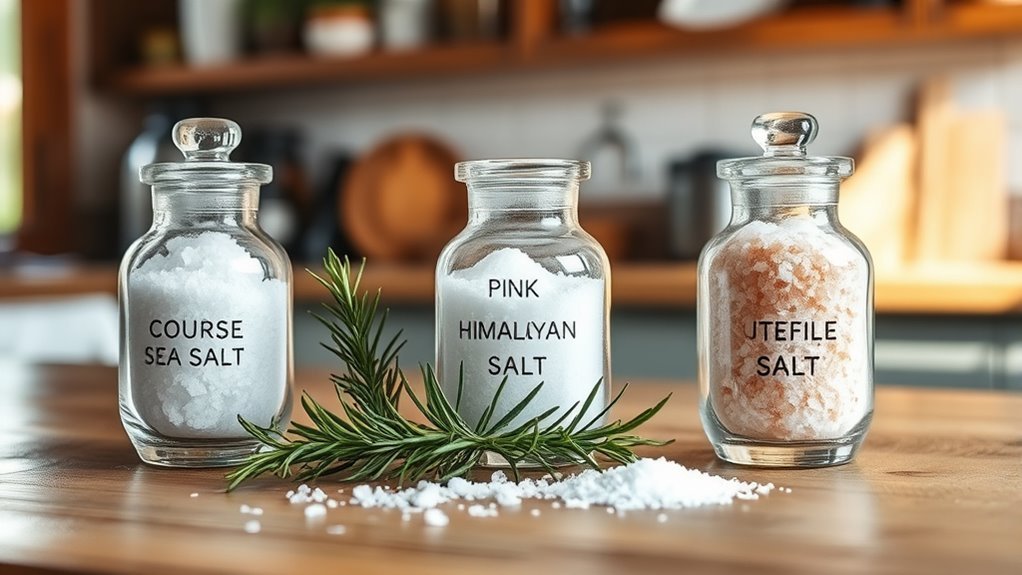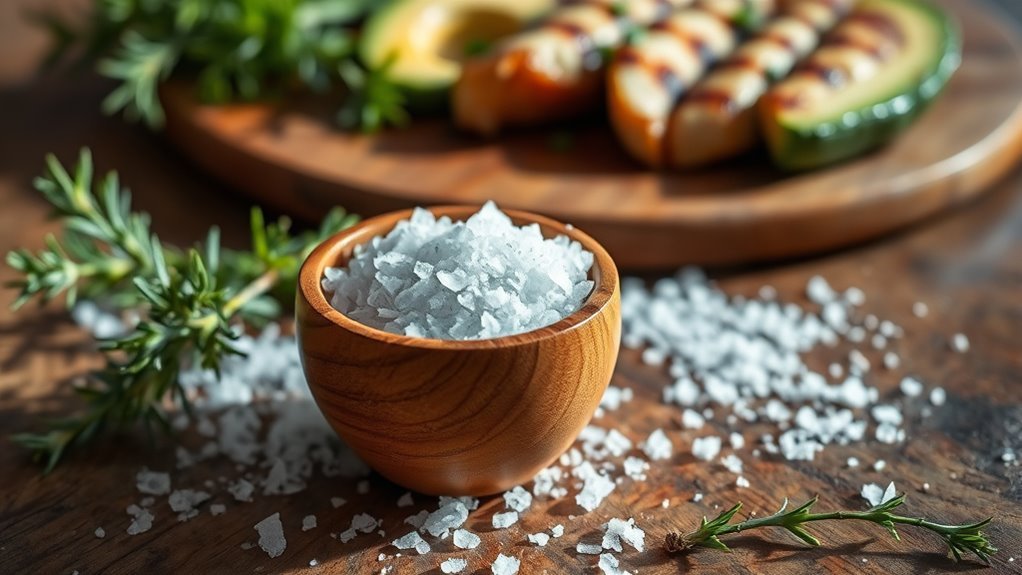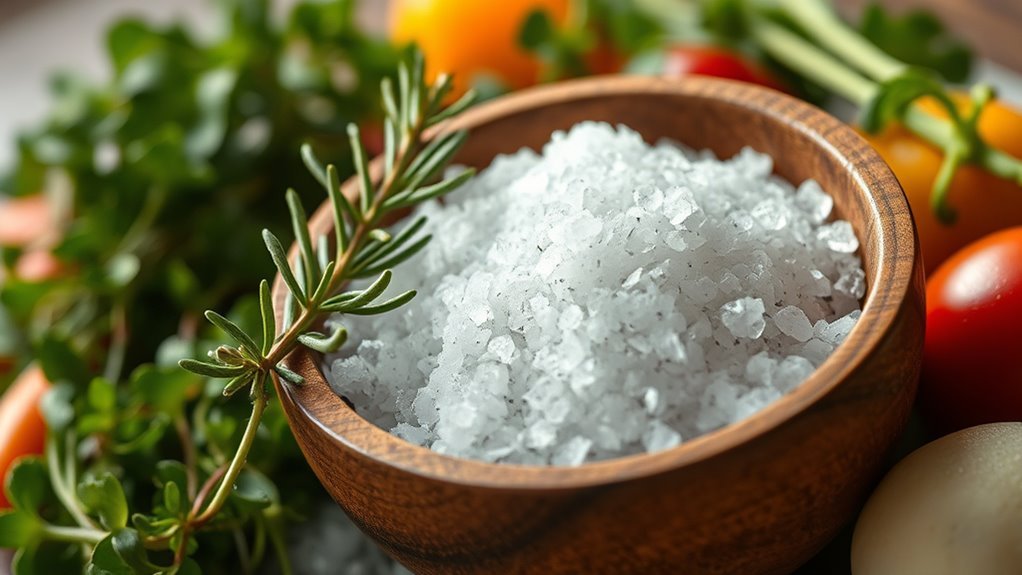Yes, salt is keto-friendly and essential for your health on a ketogenic diet. As you reduce your carbohydrate intake, your body needs more sodium—typically between 3,000 to 5,000 mg daily—to maintain hydration and electrolyte balance. Sodium plays a significant role in nerve function and muscle contraction, helping you feel more energized. Different types of salt can enhance your meals, so understanding your options and needs is key. There’s much more to learn about salt and keto!
Understanding the Ketogenic Diet

While many people are drawn to the ketogenic diet for its potential benefits, understanding its principles is vital for success. At its core, the ketogenic diet emphasizes low carbohydrate intake, which shifts your body into a state of fat adaptation. This means your body learns to burn fat for fuel instead of carbohydrates, promoting weight loss and improving energy levels. To achieve this, you’ll need to substantially reduce your carb consumption while increasing healthy fats. It’s essential to recognize that the change may come with challenges, such as the “keto flu.” However, embracing the ketogenic principles can lead to lasting results and greater freedom in managing your health. Remember, balanced nutrition is fundamental for sustaining this lifestyle long-term.
The Importance of Electrolytes

Electrolytes play a vital role in keeping you hydrated and maintaining a proper nutrient balance, especially on a ketogenic diet. When you reduce carbohydrate intake, your body excretes more electrolytes, which can lead to imbalances. Ensuring you get enough sodium, potassium, and magnesium is essential for peak health and performance.
Role in Hydration
When you’re following a keto diet, maintaining proper hydration is essential, especially since the body excretes more water and electrolytes during this metabolic shift. To support your hydration strategies, it’s important to focus on sodium sources. Sodium plays a significant role in retaining fluid and balancing electrolytes, helping to prevent dehydration and its associated symptoms, like fatigue and dizziness. Incorporating salt into your meals can enhance your sodium intake, ensuring you stay hydrated. Additionally, consider other electrolyte-rich foods or supplements to further support your hydration. Remember, staying properly hydrated not only helps your overall well-being but also optimizes your keto experience, allowing you to enjoy the freedom of this lifestyle without unnecessary discomfort.
Maintaining Nutrient Balance
To maintain a nutrient balance on a keto diet, paying attention to electrolytes is vital. Electrolytes like sodium, potassium, and magnesium play essential roles in muscle function, hydration, and overall health. Since keto often involves reduced carbohydrate intake, you may lose these minerals more quickly, leading to imbalances. To counteract this, focus on nutrient density by incorporating rich mineral sources into your meals. Foods such as leafy greens, avocados, and nuts can help replenish your electrolyte levels. Additionally, consider adding a pinch of salt to your dishes for sodium, a key electrolyte. Balancing your electrolytes not only supports your keto journey but also guarantees you feel your best while enjoying the freedom this lifestyle offers.
How Salt Affects Your Body

Salt plays a vital role in maintaining sodium balance, which is essential for your overall health. When you’re on a keto diet, your body may lose more electrolytes, making it even more important to manage your salt intake to stay hydrated. Understanding how salt affects your body can help you optimize your diet and support your well-being.
Sodium Balance Importance
Although you might think of salt primarily as a seasoning, its role in maintaining sodium balance is crucial for your overall health. Sodium is essential for nerve function and muscle contraction, and it helps regulate blood pressure. You get sodium from various sources, including processed foods, sea salt, and table salt, each with different compositions and sodium content. While some salt types, like Himalayan pink salt, contain trace minerals, the key is to maintain a balanced intake. Too little sodium can lead to health issues like low blood pressure, while excessive consumption can increase the risk of heart disease. Understanding your sodium needs can empower you to make informed dietary choices and enjoy the freedom of a balanced lifestyle.
Hydration and Electrolytes Effects
When you consume salt, it plays an essential role in maintaining hydration and electrolyte balance in your body. Sodium, a key component of salt, helps regulate fluid balance, ensuring your cells function efficiently. When you’re on a keto diet, your body’s reliance on salt increases, as you may lose more electrolytes through urine. Implementing effective hydration strategies becomes important; consider incorporating electrolyte sources like potassium and magnesium alongside your salt intake. This can help prevent symptoms like fatigue and muscle cramps. Remember, while salt is significant, moderation is important. Too much can lead to other health issues, so strike a balance that supports your well-being while enjoying the freedom of a keto lifestyle.
Types of Salt: Which Is Best for Keto?
Which types of salt are best suited for a ketogenic diet? When it comes to salt varieties, you’ve got options. Sea salt offers benefits like trace minerals that can enhance flavor and health. Himalayan salt, often recognized by its pink hue, is rich in minerals and can be a great choice for those wanting to boost their mineral content. Kosher salt, with its larger grains, provides a unique texture and flavor profile, making it excellent for cooking. In contrast, table salt is often stripped of minerals and may contain additives. Understanding these table salt differences helps you choose wisely, allowing you to enjoy the flavors while adhering to your keto lifestyle.
Recommended Daily Salt Intake on Keto
When you’re on a ketogenic diet, it’s essential to pay attention to your sodium intake. The body often requires higher levels of sodium to compensate for the loss of electrolytes, especially in the early stages of keto. Understanding the daily sodium requirements and the potential effects of low sodium can help you maintain balance and overall health.
Daily Sodium Requirements
While many people associate low-carb diets with reduced salt intake, it’s important to understand that sodium plays a crucial role in the ketogenic lifestyle. On a keto diet, your daily sodium requirements can be higher than the standard recommendations. Adequate sodium helps maintain hydration and electrolyte balance, especially as your body adapts to ketosis.
You should aim for about 3,000 to 5,000 mg of sodium daily, depending on your activity level and personal needs. Consider these daily sodium sources:
- Sea salt or Himalayan salt
- Broths and stocks
- Pickled vegetables
- Low-carb snacks with added salt
Effects of Low Sodium
Not getting enough sodium on a keto diet can lead to several negative effects on your health and well-being. A sodium deficiency can result in symptoms like fatigue, dizziness, and muscle cramps, which can be particularly challenging when you’re adjusting to ketosis. Low sodium levels may also disrupt your metabolism, affecting how efficiently your body burns fat. Without adequate sodium, you might experience decreased energy levels and increased cravings, potentially derailing your weight loss goals. It’s essential to listen to your body and maintain a balanced intake of salt while enjoying the freedom that a keto lifestyle offers. Remember, incorporating the right amount of sodium supports overall health and helps you thrive on your keto journey.
Salt and Keto Flu: What You Need to Know
Understanding the relationship between salt intake and the keto flu is essential for anyone starting a ketogenic diet. When you cut carbs, your body loses water and electrolytes, leading to potential salt cravings and symptoms of the keto flu. To combat this, consider incorporating adequate sodium sources into your diet. Here’s what you need to know:
- Increased Sodium Needs: On keto, your sodium requirements may rise.
- Hydration: Proper salt intake helps maintain fluid balance.
- Electrolyte Balance: Sodium supports overall electrolyte function.
- Food Choices: Include high-sodium foods like broth, olives, and pickles.
Potential Health Benefits of Salt on a Keto Diet
Incorporating salt into your keto diet can offer several health benefits that support overall wellness and metabolic function. Adequate sodium intake helps maintain fluid balance, which is vital when your body shifts into ketosis. This change often leads to increased water loss, making salt benefits even more significant. It can also aid in muscle function and nerve signaling, promoting better performance during workouts.
When looking for sodium sources, consider options like Himalayan pink salt or sea salt, as they contain trace minerals that can enhance your diet. However, it’s important to balance salt consumption with overall health needs, ensuring you’re not overdoing it. Embracing these salt benefits can help you thrive on your keto journey.
Common Misconceptions About Salt and Keto
While many people believe that salt should be avoided on a keto diet, this misconception can lead to unnecessary dietary restrictions. In reality, understanding salt is essential for maintaining balance in your body. Let’s debunk some common sodium myths:
- Salt causes weight gain: Sodium doesn’t inherently lead to fat gain; excess water retention can be temporary.
- All salt is bad: Natural sea salt and Himalayan salt contain beneficial minerals and can enhance flavor.
- Keto means low salt: A low-carb diet can lead to decreased sodium levels; replenishing is important.
- Salt is linked to high blood pressure for everyone: Individual responses to sodium vary; many people can enjoy it without issues.
Embracing the right amount of salt can support your keto journey!
Tips for Incorporating Salt Into Your Keto Meals
Salt can actually play a beneficial role in your keto meals when used wisely. To enhance flavor without compromising your diet, explore various salt types like Himalayan pink salt or sea salt, which contain trace minerals. You can also utilize seasoning alternatives, such as herbs and spices, to add depth to your dishes while keeping sodium levels in check. For instance, garlic powder or smoked paprika can elevate the taste of your meats and veggies without relying solely on salt. When preparing meals, sprinkle salt at different stages of cooking to balance flavors and prevent over-salting. Remember, moderation is key, so adjust based on your personal preferences and dietary needs, ensuring your meals are both flavorful and keto-friendly.
Listening to Your Body: When to Adjust Your Salt Intake
How do you know when it’s time to adjust your salt intake on a keto diet? Listening to your body is essential, as it provides important cues about your salt needs. Pay attention to these body responses:
Listening to your body is crucial for adjusting your salt intake on a keto diet.
- Increased fatigue: You might feel more tired than usual, indicating a possible electrolyte imbalance.
- Muscle cramps: Frequent cramping can signal that your body needs more sodium.
- Headaches: These might arise due to dehydration or low salt levels.
- Changes in appetite: A sudden shift in cravings or hunger can suggest the need for personal adjustments.
Maintaining dietary awareness will help you fine-tune your salt intake, ensuring you feel your best while enjoying the freedom of a keto lifestyle.
Frequently Asked Questions
Can I Use Salt Substitutes on a Keto Diet?
Yes, you can use salt substitutes on a keto diet. Many salt alternatives, like potassium chloride, can help you manage your sodium intake while still adding flavor to your meals. However, it’s important to monitor your overall electrolyte balance, as too much potassium can be harmful. Consider your individual health needs and preferences, and don’t hesitate to consult a healthcare professional to guarantee you’re making the best choices for your keto journey.
Does Salt Affect Weight Loss on Keto?
When you’re on keto, salt’s role in weight loss isn’t straightforward. It’s essential for maintaining sodium balance, which can help manage keto cravings. If you restrict salt too much, you might feel lethargic or crave carbs. However, excessive salt can lead to water retention, masking true weight loss. It’s about finding that balance—using salt to support your diet without overdoing it. Listen to your body, and adjust accordingly for best results.
Is Himalayan Salt Better Than Regular Salt for Keto?
When comparing Himalayan salt to regular salt, you’re looking at a few key differences. Himalayan salt boasts trace minerals that can offer health benefits, like improved hydration and electrolyte balance. On the other hand, regular salt is often just sodium chloride. While both can be used in a keto diet, Himalayan salt might provide additional minerals that enhance your overall well-being. Ultimately, it comes down to personal preference and how you feel on your diet.
Can Too Much Salt Kick Me Out of Ketosis?
Too much salt won’t necessarily kick you out of ketosis, but it can affect your ketogenic balance. While salt intake is vital for electrolyte balance, excessive consumption may lead to dehydration or increased blood pressure. It’s essential to monitor how your body responds. Enjoying salt in moderation can enhance flavors without jeopardizing your keto journey, allowing you the freedom to explore various dishes while maintaining your health goals. Always listen to your body’s signals!
How Do I Know if I Need More Salt?
To know if you need more salt, pay attention to your body’s signals. Symptoms like headaches, fatigue, or muscle cramps might indicate an imbalance in sodium. You should also consider your overall salt intake, especially if you’re active or sweating more. Maintaining a healthy sodium balance is essential for proper hydration and bodily functions. If you’re unsure, consulting a healthcare professional can provide personalized advice tailored to your lifestyle and dietary needs.
Frequently Asked Questions About Salt and Keto
1. Is salt considered keto-friendly?
Yes, salt is generally considered keto-friendly. It contains no carbohydrates and does not affect insulin levels, making it compatible with a ketogenic diet. In fact, when following a keto diet, the body excretes more sodium, so maintaining adequate salt intake is important for hydration and electrolyte balance.
2. Can I use any type of salt on a keto diet?
Most types of salt, including table salt, sea salt, and Himalayan pink salt, are keto-friendly. Each type has slightly different mineral content, but they all provide essential sodium without carbohydrates. However, it’s advisable to choose unrefined salts when possible to benefit from trace minerals.
3. How much salt should I consume on a keto diet?
The amount of salt needed can vary based on individual dietary needs, activity level, and overall health. On a keto diet, many people find they need to increase their salt intake to compensate for the loss of sodium through urine. A general guideline is to consume about 3,000 to 5,000 mg of sodium per day, but it’s essential to listen to your body and consult a healthcare provider for personalized advice.
4. What are the health implications of consuming too much salt on a keto diet?
While salt is essential for health, excessive consumption can lead to high blood pressure and other cardiovascular issues. It’s crucial to balance salt intake with potassium-rich foods, which can help regulate blood pressure. Monitoring your sodium intake and consulting with a healthcare professional can help you maintain a healthy balance while on a keto diet.
5. Can salt help with keto flu symptoms?
Yes, increasing salt intake can help alleviate some symptoms of the keto flu, which may occur during the initial phase of a ketogenic diet. Symptoms like headache, fatigue, and muscle cramps can be linked to electrolyte imbalances. Consuming adequate salt can help replenish sodium levels and support hydration, potentially easing these symptoms.
References
- https://www.ncbi.nlm.nih.gov/pmc/articles/PMC6019294/
- https://www.healthline.com/nutrition/keto-diet-101
- https://www.webmd.com/diet/obesity/what-is-keto-diet
- https://www.mayoclinic.org/healthy-lifestyle/nutrition-and-healthy-eating/expert-answers/keto-diet/faq-20457146
- https://www.health.gov.au/resources/publications/the-ketogenic-diet
- https://www.verywellfit.com/keto-diet-5113288
- https://www.nutrition.gov/topics/nutrition-101/salt-and-sodium
- https://www.cdc.gov/salt/index.htm


